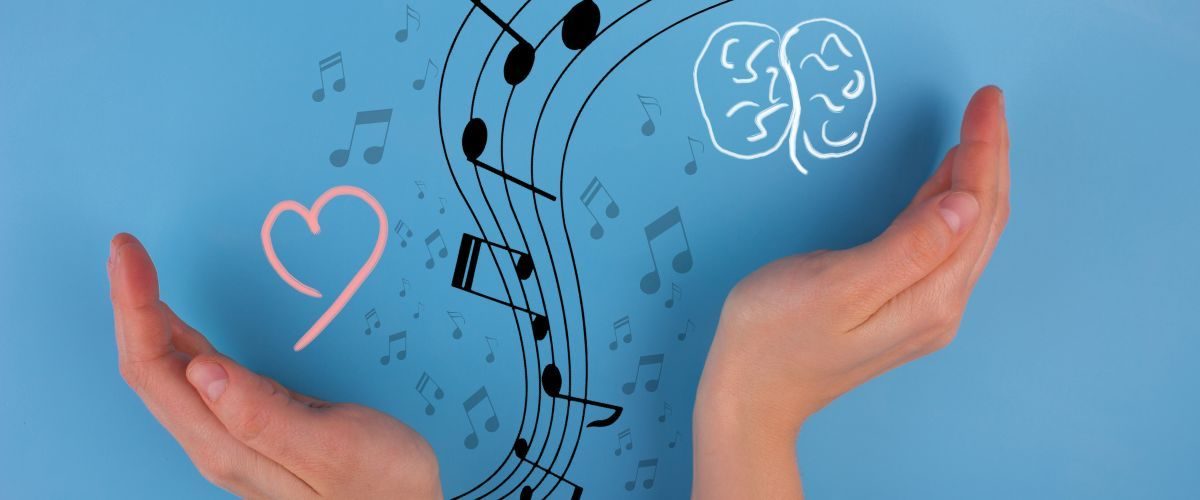
Feeling like life is a never-ending series of stressful meetings, deadlines, and chores?
Spice things up by trading just 30 minutes of your day for some music practice, and you can reduce your stress by 25%.
Science doesn’t lie—a recent study by Frontiers in Psychology shows that music practice helps develop mental models, thus easing your worries. Let’s discover how strumming a guitar or tapping those keys can become your ultimate stress-busting tool!
How Music Influences the Brain and Body

Music impacts the brain’s structure and function. It can activate the brain’s reward centers, releasing dopamine, a pleasure-inducing neurotransmitter.
Listening to or practicing music can also lower cortisol levels, reducing stress. It enhances mood and induces relaxation by stimulating alpha brain waves associated with calm states.
Music practice fosters deep breathing and relaxation responses. This physiological effect slows heart rate and reduces anxiety, providing an effective means to combat stress.
Understanding the Psychological Impact of Music
Music’s beat and tempo can dramatically alter the mood. Upbeat tunes often uplift spirits, while slow melodies offer relaxation. This isn’t just anecdotal; it’s supported by research, including the “Mental Model Development in Multimedia Learning” study published in Frontiers in Psychology.

In 30 minutes, rhythmic patterns and harmonious tones can decrease cortisol levels by 25%. This effortless practice can be an enjoyable way to alleviate stress and improve mental clarity.
This study indicates that engaging with music doesn’t merely entertain; it has profound physiological benefits.
Playing an instrument prompts the release of endorphins, the body’s natural stress fighters. Additionally, it fosters a sense of accomplishment and can help regulate heart rate and blood pressure.
Cognitive and Physical Advantages
Practicing music regularly can significantly sharpen cognitive skills. It involves a mix of listening, coordination, and memory, which helps improve brain function.
This is beneficial for musicians and anyone looking to keep their minds active and engaged.
Reading music and multitasking between playing and listening strengthen brain pathways. This exercises both the left and right hemispheres, promoting overall brain health. There’s evidence suggesting that musicians often have enhanced memory and problem-solving skills.
Music practice also encourages physical benefits. These include improved hand-eye coordination and fine motor skills, mainly when playing piano or guitar.
Good posture and breathing techniques while playing can contribute to overall physical well-being.


Emotional Advantages
Regular music practice provides a substantial boost to emotional well-being. Engaging with music can act as a therapeutic outlet, allowing individuals to process emotions effectively.

Playing an instrument can release endorphins, often referred to as “feel-good” hormones. This natural boost in mood is essential for stress relief. Besides, the sense of accomplishment from mastering a piece can uplift spirits and encourage perseverance.
Additionally, music practice fosters creativity and self-expression. This allows for an emotional release that might be difficult to achieve through words alone. Individuals can also experience a deepened sense of satisfaction and joy by creating a personal connection with music.
Long-Term Stress Management

Over time, music practice equips individuals with effective long-term stress management techniques. Integrating music into their daily routines creates a reliable mechanism to combat stress.
Engaging with music regularly allows for the development of mindfulness and focus. When playing an instrument, one must concentrate fully on the task at hand, which can serve as a form of meditation and reduce stress.
Furthermore, music practice promotes a disciplined approach to life. The regular commitment and routine required to improve in music can translate to better time management and a more structured daily life. This stability is crucial for managing stress in the long run.
Building a Consistent Music Practice Habit

Making music practice a part of the daily routine is key. Designating a specific time each day for practice means it becomes a natural habit.
Morning or evening sessions? Whichever fits the lifestyle best, the key is consistency.
A comfortable, dedicated space can make practice sessions more inviting. This space should be free from distractions and set up with all necessary instruments and materials.
Short bursts of practice can be helpful; instead of long sessions, try two or three 10-minute sessions scattered throughout the day. This approach can keep the mind fresh and engaged. The ultimate goal is to make the practice enjoyable and stress-free.
Music Therapy: An Overview
Music therapy employs sound as a tool to enhance psychological health. Certified therapists use structured sessions to address specific emotional and cognitive needs. This isn’t limited to just listening; it can include playing instruments, singing, and composing.
Clinical evidence supports its benefits for conditions like anxiety, depression, and PTSD. Engaging with music actively can trigger neural pathways that foster emotional resilience and stability.

This conclusion aligns well with findings in the study “Corrigendum: Mental Model Development in Multimedia Learning” from Frontiers in Psychology.
Emotions play a critical role in shaping our experiences. The interrelation between self-monitoring and emotional responses is evident when engaging with music practice.
By integrating music practice into daily routines, individuals can effectively manage stress and potentially improve their mental well-being.
So, pick up that guitar or hum a tune; it might just be the key to a brighter day.
ABOUT:
Robert Emery created Ted’s List during the lockdown of Covid-19. Aside from entertaining audiences worldwide, he tries to inspire the young musicians of tomorrow. Ted’s List can help enormously with this task, as all the writers are world-class, professional musicians. Ted’s List covers all instruments, from Electric Guitar to Violin and Clarinet. Each instrument has a set of dedicated help articles, giving instructional advice on how to play the instrument, and how to improve. There are also informative reviews based on specific instruments, to help the musician choose the best instrument for them.
MEDIA CONTACT INFORMATION:
All press enquiries go to:
Paul Smith – Head of Press/PR
info (at) teds-list.com


